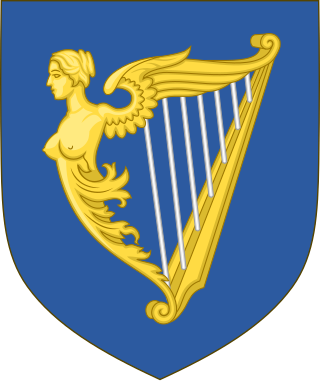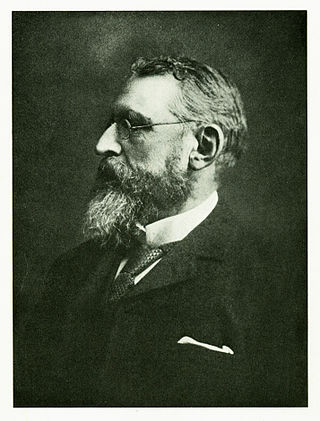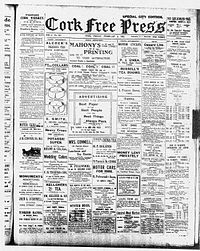Related Research Articles

The Irish Parliamentary Party was formed in 1874 by Isaac Butt, the leader of the Nationalist Party, replacing the Home Rule League, as official parliamentary party for Irish nationalist Members of Parliament (MPs) elected to the House of Commons at Westminster within the United Kingdom of Great Britain and Ireland up until 1918. Its central objectives were legislative independence for Ireland and land reform. Its constitutional movement was instrumental in laying the groundwork for Irish self-government through three Irish Home Rule bills.

William O'Brien was an Irish nationalist, journalist, agrarian agitator, social revolutionary, politician, party leader, newspaper publisher, author and Member of Parliament (MP) in the House of Commons of the United Kingdom of Great Britain and Ireland. He was particularly associated with the campaigns for land reform in Ireland during the late 19th and early 20th centuries as well as his conciliatory approach to attaining Irish Home Rule.

Daniel Desmond Sheehan, usually known as D. D. Sheehan was an Irish nationalist, politician, labour leader, journalist, barrister and author. He served as Member of Parliament (MP) in the House of Commons of the United Kingdom of Great Britain and Ireland representing Mid-Cork from 1901 to 1918, a constituency comprising the districts of Ahadallane, Ballincollig, Ballyvourney, Blarney, Coachford, Farran, Inchigeelagh, Macroom, Millstreet and Shandangan. As co-founder and President of the Irish Land and Labour Association, he was credited with considerable success in land reform, labour reforms and in rural state housing. From 1909, he was General Secretary of the Central Executive of the All-for-Ireland League, favouring a policy of National reconciliation between all creeds and classes in Ireland. During World War I he served as Irish regiments officer with the 16th (Irish) Division in France, 1915–16. He resigned his parliamentary seat in 1918 and lived in England for several years, returning to Dublin following the ending of the civil war, when he was appointed editor of the Dublin Chronicle.

The All-for-Ireland League (AFIL) was an Irish, Munster-based political party (1909–1918). Founded by William O'Brien MP, it generated a new national movement to achieve agreement between the different parties concerned on the historically difficult aim of Home Rule for the whole of Ireland. The AFIL established itself as a separate non-sectarian party in the House of Commons of the United Kingdom of Great Britain and Ireland, binding a group of independent nationalists MPs to pursue a broader concept of Irish nationalism, a consensus of political brotherhood and reconciliation among all Irishmen, primarily to win Unionist consent to an All-Ireland parliamentary settlement.
Cork City was a parliamentary constituency in Ireland, represented in the Parliament of the United Kingdom. From 1880 to 1922 it returned two members of parliament (MPs) to the House of Commons of the United Kingdom of Great Britain and Ireland. From 1922 it was not represented in the UK Parliament, as it was no longer in the UK.
West Cork, a division of County Cork, was a parliamentary constituency in Ireland, represented in the Parliament of the United Kingdom. From 1885 to 1922 it returned one Member of Parliament (MP) to the House of Commons of the United Kingdom of Great Britain and Ireland.
North East Cork, a division of County Cork, was a parliamentary constituency in Ireland, represented in the Parliament of the United Kingdom. From 1885 to 1922 it returned one Member of Parliament (MP) to the House of Commons of the United Kingdom of Great Britain and Ireland.

The Irish Land and Labour Association (ILLA) was a progressive movement founded in the early 1890s in Munster, Ireland, to organise and pursue political agitation for small tenant farmers' and rural labourers' rights. Its branches also spread into Connacht. The ILLA was known under different names—Land and Labour Association (LLA) or League (LLL). Its branches were active for almost thirty years, and had considerable success in propagating labour ideals before their traditions became the basis for the new labour and trade unions movements, with which they gradually amalgamated.

The United Irish League (UIL) was a nationalist political party in Ireland, launched 23 January 1898 with the motto "The Land for the People". Its objective to be achieved through agrarian agitation and land reform, compelling larger grazier farmers to surrender their lands for redistribution among the small tenant farmers. Founded and initiated at Westport, County Mayo by William O'Brien, it was supported by Michael Davitt MP, John Dillon MP, who worded its constitution, Timothy Harrington MP, John O'Connor Power MP and the Catholic clergy of the district. By 1900 it had expanded to be represented by 462 branches in twenty-five counties.

James Gilhooly (1847–1916) was an Irish nationalist politician and MP. in the House of Commons of the United Kingdom of Great Britain and Ireland as member of the Irish Parliamentary Party, from 1910 the All-for Ireland Party, who represented his constituency from 1885 for 30 years until his death, retaining his seat in eight elections.

Eugene Crean (1854–1939) was an Irish nationalist politician and MP in the House of Commons of the United Kingdom of Great Britain and Ireland and member of the Irish Parliamentary Party 1892–1910, for the All-for Ireland Party 1910–1918.

Edmund Leamy was an Irish journalist, barrister, author of fairy tales, and nationalist politician. He was a Member of Parliament (MP) in the House of Commons of the United Kingdom of Great Britain and Ireland as member of the Irish Parliamentary Party. A leading supporter of Charles Stewart Parnell, he represented various Irish seats for much of the period from 1880 until his death in 1904.
Augustine Roche was an Irish Parliamentary Party politician from Cork. He was a Member of Parliament (MP) from 1905 to 1910, and from 1911 until his death.

The Cork Free Press was a nationalist newspaper in Ireland, which circulated primarily in the Munster region surrounding its base in Cork, and was the newspaper of the dissident All-for-Ireland League party (1909–1918). Published daily from June 1910 until 1915, and weekly in 1915–16, it was the third of three newspapers founded and published within a decade by William O'Brien MP. It developed a unique approach to the national question and to the social issues of the day, with a pronounced conciliatory view to achieving Home Rule for the whole of Ireland. It displayed a favourable attitude towards the Sinn Féin movement. Its main rival newspapers were the Cork Examiner and the Freeman's Journal.
James John O'Shee or Shee usually known as J. J. O'Shee, was an Irish nationalist politician, solicitor, labour activist and Member of Parliament (MP) in the House of Commons of the United Kingdom of Great Britain and Ireland representing the constituency of West Waterford from 1895 until 1918. Elected as an Anti-Parnellite Irish National Federation member of the Irish Parliamentary Party he was one of the more socially radical members of the party. He co-founded and was secretary from 1894 of the Irish Land and Labour Association
The 1918 East Cavan by-election was a parliamentary by-election held for the United Kingdom House of Commons constituency of East Cavan on 20 June 1918. The election was caused by the death of the sitting member, Samuel Young of the Irish Parliamentary Party.
The 1887 North East Cork by-election was a parliamentary by-election held for the United Kingdom House of Commons constituency of North East Cork on 16 May 1887. The vacancy arose because of the resignation of the sitting member, Edmund Leamy of the Irish Parliamentary Party. In the ensuing by-election another Irish Parliamentary Party candidate, William O'Brien, former member for South Tyrone, was elected unopposed.
The 1916 West Cork by-election was held on 15 November 1916. The by-election was held due to the death of the incumbent All-for-Ireland League MP, James Gilhooly. It was won by the Irish Parliamentary Party candidate Daniel O'Leary.
References
- ↑ Craig, F. W. S. (18 June 1974). British Parliamentary Election Results: 1885-1918. Springer. ISBN 978-1-349-02298-4.
- ↑ The Constitutional Year Book. Conservative central office. 1922.